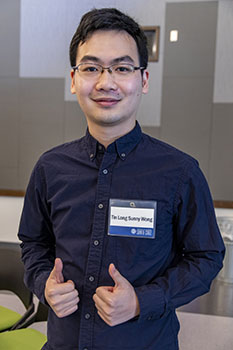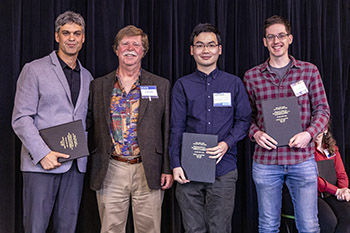Tin Long Sunny Wong may be 22, but he’s been gazing at the stars and studying celestial bodies for half his life—since he was a middle-school student in Hong Kong.
Looking up at the night sky through an astrophotography telescope, he was amazed to see pulses of bright light from distant supernovae.
Now, all those years of passion, curiosity, problem-solving, and determination are paying off. Wong, who goes by the first name “Sunny,” is this year’s winner of the Steck Family Award, honoring the most outstanding senior research project chosen from 15 projects that have already won the highly prestigious Chancellor Award.
“I feel very honored,” Wong said, adding that it was especially gratifying to get such strong validation from his project mentors, UC Santa Cruz Professor and Chair of Astronomy and Astrophysics Enrico Ramirez-Ruiz and Postdoctoral Scholar Josiah Schwab, a Hubble Fellow at UC Santa Cruz.
“It’s amazing to get their recognition because they are both very great mentors and very respectable scientists,” Wong said. “Enrico has always been pushing me toward being a better scientist in communicating my work well and trying to make sure there is a clear message brought out in my paper.”
Wong will receive bound copies of his thesis to share with family and friends and a $1,000 honorarium.
The same supernovae that so entranced Wong during his childhood served as his thesis subject matter. To be more specific, Wong studied the conditions that cause white dwarf stars to burst into thermonuclear supernovae.
White dwarfs are the celestial bodies that are left behind when stars begin to die. Normally, these enormous cosmic cinders merely dim and cool, but a few of these white dwarfs grow by stealing the mass of nearby “companion’’ stars. These white dwarfs, which have the mass of the sun and are roughly the same size as planet Earth, grow and grow until they reach a critical mass, starting a carbon-fusion reaction in their centers and blowing themselves up in bright and powerful supernovae.
Schwab said these supernovae are of special interest to astrophysicists because these bright explosions are “cosmic beacons” that help scientists measure intergalactic distances and develop a better understanding of the cosmos, including the Nobel Prize–winning discovery that the universe is expanding at an accelerating rate. To research his thesis, Wong used UC Santa Cruz supercomputers to simulate hundreds of combinations of white dwarfs and stars at different distances and masses, looking to find out which pairings would result in cataclysmic events.
The end result was a thesis that greatly impressed Ramirez-Ruiz and Schwab. Then again, Wong showed tremendous potential even before completing his celebrated thesis.
“Usually, only 1 percent of undergraduates in physics contribute to first-author papers, and Sunny did this in the fastest time I have seen an undergraduate do it,” Ramirez-Ruiz said. “Now he’s working on a second one. His determination and grit, and also brilliance, is unlike anything I’ve seen before.”
Loren Steck (Porter ’73), whose family created the award, said every one of this year’s finalists did incredible work.
“You guys are amazing!” he gushed. “I did a couple of theses at UC Santa Cruz, and I know how hard they are and how important they can be for your careers.” He said their sterling work also speaks to the enormous importance of these students’ mentors, who guided and supported their projects.
Wong will soon head to UC Santa Barbara for graduate work in astrophysics, but for now, he is savoring the moment. Among the people who are singing his praises are his mother and father in Hong Kong. Neither parent comes from a science background. His father is a correctional officer and his mother a nurse.
“I think they’re proud of me,” he said with a smile.




